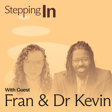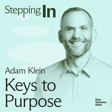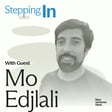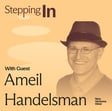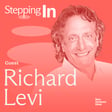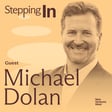Become a Creator today!Start creating today - Share your story with the world!
Start for free
00:00:00
00:00:01

Power of Empathy
Whitney Hess, a coach, writer, and designer, sits down with Adam Klein to delve into the nuanced topic of empathy in an insightful exploration of what true empathy is, distinguishing it from sympathy and compassion.
Listeners will gain a richer understanding of empathy and its integral role in building meaningful personal and professional connections.
Here are some of the topics covered in the Stepping In podcast episode The Power of Empa
Transcript
Introduction to Episode and Integral Coaching
00:00:06
Speaker
This is Adam Klein, Global Graduate Director, faculty member at New Ventures West. This is episode 16 of our podcast Stepping In, a podcast where we delve into how integral coaching can address some of the most pressing issues we face as individuals, as communities, and as stewards of our planet.
Empathy in Business with Whitney Hess
00:00:24
Speaker
For this episode, I sat down with Whitney Hess to speak about empathy.
00:00:28
Speaker
what it is and how it's different than compassion and sympathy. Whitney has as a coach writer and designer on a mission to put humanity back into business. She helps leaders and teams bring their whole selves to their work. Whitney believes empathy builds empires. Now onto my conversation with Whitney.
Origins and Definition of Empathy
00:00:48
Speaker
My understanding is that the word empathy itself has only come into
00:00:58
Speaker
more popular use recently. It is a German word that is literally translated to feeling into. And I feel connected to that meaning because I think we often use it
00:01:27
Speaker
interchangeably with sympathy, we use it interchangeably with compassion, and there is a variation to the word empathy itself, which is the felt experience of another person's emotions and needs. Not the intellectual awareness of
00:01:55
Speaker
another person's emotions and needs, and not even the desire to help when seeing someone in need, which is more associated with compassion. So I see empathy as this much more specific way of describing the skill that we have innately
00:02:24
Speaker
that we can also build intentionally and the somatic and emotional experience of feeling into another person's emotional state and understanding their needs
00:02:53
Speaker
as they relate to the feelings that they're experiencing. That's so great. I'm glad that you brought in the other two words, like you said, that often get used as synonyms, but they're not, which is sympathy and compassion. So could you say a little bit about how you see those two? You said a couple words, but just a little bit more about sympathy and compassion and then
00:03:23
Speaker
maybe the world that these are three are describing, but how they are also unique.
Sympathy vs. Empathy
00:03:33
Speaker
Absolutely. So, sympathy and empathy sound a lot alike. Yes. So, they get, so I think they get used interchangeably because of that.
00:03:53
Speaker
But sympathy really translates more closely to, you know, feeling sorry for or pity. It's like when you feel for someone. Yes. Right. They're going through something. You have a heart. You can witness their pain. You sympathize.
00:04:21
Speaker
they're in an emotional state and you have an awareness of it and you're extending yourself to them in that way. But feeling for someone and feeling into the literal translation of empathy in the original German word is very different because with
00:04:51
Speaker
sympathy, there is, first of all, an implication or an assumption that this is negative, or that there's sort of an over all sadness around it. And the empathy can be around any emotion, not just the negative or uncomfortable ones. And
00:05:18
Speaker
sympathy also has a way of separating the other person's experience from your experience. Like they're there in that box in their emotion. You're here in your box and you can at a distance see that they're suffering and you can feel for them.
00:05:47
Speaker
But empathy is actually the act of putting yourself into another person's experience with them.
Myths and Misunderstandings of Empathy
00:06:00
Speaker
And it's not about trying to identify with them and saying, oh, I've experienced the same thing. I know how that is.
00:06:12
Speaker
or some of the other mistakes that I think we sometimes make in doing what we think is empathy. And I can get into a whole list of things that are sort of myths of empathetic behavior or empathetic communication. But it really is about being with the person and feeling into the emotions
00:06:40
Speaker
and needs of that other person and experiencing it yourself.
Empathy vs. Compassion
00:06:47
Speaker
For me, compassion is in a different direction in that it is wanting to act on behalf of another person.
00:07:07
Speaker
It's wanting to do something about another person's pain and suffering. And that is the definition that causes a lot of people to actually come out against empathy. There's a movement that's going on right now around not
00:07:38
Speaker
um championing empathy and putting limits around it because when we are emphasizing we are ourselves feeling into those emotions and that can cause what's referred to as empathy burnout where it's
00:08:03
Speaker
too much and there is truth to that. And so the spotlight is being shown on compassion instead because it is active and it is intentionally to act on behalf of another person to try to help them in their suffering.
00:08:32
Speaker
But why I feel so drawn to empathy still, even though there is truth to the consequences that we can experience in being empathetic beings, and I'm experiencing that a lot today with what's going on in our world and in the news and seeing
00:09:01
Speaker
movement of people who have experienced so much pain come together to share their stories. I'm in my empathy feeling that pain. I am feeling that suffering. Even if I have not experienced the
00:09:30
Speaker
reasons why other people might be feeling that pain. And even if had I experienced those things, I might have reacted differently or I might have had a different emotional response. I'm still feeling those emotions and we have to have a lot of tools to take care of ourselves when we choose to experience that.
Empathy in Coaching and Relationships
00:10:00
Speaker
but I still feel drawn to it because I find that there's so much power in being with a person in their feelings and in their needs without having to change anything, without having to be a solution, without having to fix a problem, without even me feeling the need
00:10:31
Speaker
For the person to stop feeling what they're feeling because their feelings are too overwhelming for me I feel tremendous power in that I I feel that is so critical in My coaching practice. I feel it so critically in my relationships my friendships in my family relationships and so I I welcome the
00:10:58
Speaker
distinctions from the other ways of caring for people. And I want to go deep into this kind of connection because I see the power that it holds. Yeah. One thing I'm curious about is about how when we're feeling into someone else's experience that we can bring the resources we bring, resources, meaning our emotional somatic resources,
00:11:29
Speaker
with us into that versus being merged solely into their experience and forgetting us. Am I saying that in a way that makes sense? Yes, I love that. And that requires skill. And one of the things that I find so fascinating about empathy as a capacity is that
00:11:59
Speaker
On the one hand, it is innate and inherent. We are born with it. It lives in our bodies in the brain in the form of mirror neurons, which we use at our earliest stages of learning with imitation. If you've ever seen a parent
00:12:28
Speaker
Um, watch their little kid fall, but purposefully not get upset because they don't want to upset their child. And if they act like, you know, they're okay, they check to make sure that they're okay. Maybe it's just the skinny, but they don't get elevated in their emotional state. They know that that will translate positively to their child and the child will.
00:12:57
Speaker
have an easier time falling and recovering. Do you know what I'm referring to? That is in and of itself, a way of utilizing these mirror neurons that we naturally possess because we do have a way of mirroring the people in our environment.
00:13:24
Speaker
And especially as children, the people that we trust the most, we're looking to them for the signals of how we're supposed to feel and behave in any circumstance. And yet, even though it's this innate capacity, it is also something that we absolutely can build and develop intentionally. And so when you talk about the
00:13:54
Speaker
empathy, fatigue, empathy, burnout. It's sometimes referred to as caretaker burnout. Anyone that's in a caring profession that's taking care of someone every day that really doesn't have the capacity to fully care for themselves. They have to build these skills. Otherwise, if they are naturally
00:14:24
Speaker
empathetic and they are truly in the experience with the other person. It can be hard to maintain those personal boundaries and to remember where we end and the other person begins. Right.
00:14:52
Speaker
And that's also what I'm referring to in being very engaged with the news and seeing and hearing stories of people in pain. Sometimes we can get so caught up that we are glued to the TV or we're refreshing the page every 10 seconds or we're on social media and we're reading every single post that comes in.
00:15:22
Speaker
we can lose ourselves.
Self-Empathy and Self-Awareness
00:15:25
Speaker
And so part of building empathy skill that's most critical that I find doesn't get talked about enough is self empathy, which is a funny term because empathy is, you know, typically defined as, you know, walking a mile in someone else's shoes.
00:15:50
Speaker
How can we apply that to ourselves? Well, the reality is that our capacity to feel into another person's experience hinges on our capacity to feel into our own experience. And if we are there in the moment with another person, or even with a movement of people, a group of people who are experiencing something that
00:16:19
Speaker
we may somewhat identify with or we may just have the capacity to bear witness to and so we're in that experience with them. If we're not making space to feel into our own experience and to recognize the feelings and needs that are emerging within us as we are there to support other people or as
00:16:48
Speaker
we are experiencing others emotions and needs, then we're missing a critical component to the sustainability of our efforts. And so I've been spending a lot more time recently, not only working on my own self empathy practices, which I take as being able to identify my emotions and my needs,
00:17:17
Speaker
in the present moment and building the skill to do that and having the words to capture what it is that I'm experiencing, to label it and to give it sort of air in my ecosystem. I'm also spending more time reading and doing research on
00:17:44
Speaker
self-empathy practice because there's a lot out there and I don't think that it gets the attention that it deserves. Do you have some top of mind that you can share with us some of the self-empathy practices or what you're learning about that? Yes. I think that would be really helpful for people listening.
Enhancing Empathetic Skills with Nonviolent Communication
00:18:09
Speaker
So one area that I have
00:18:14
Speaker
A tremendous fondness for in a place that I've really been investing a lot of time over the past few years is in nonviolent communication. And there is an incredible community around the world that comes together to practice nonviolent communication, both in the language, meaning the words
00:18:43
Speaker
that are used to speak with one another compassionately and to use the tools of NBC to resolve conflicts and to create connection between people, but also with nonviolent communication as a consciousness or sort of a way of being in New Ventures West terms so that we can
00:19:13
Speaker
listen more clearly, not just communicate or speak with more empathy, but we can listen with more empathy in everyday conversations and hear the underlying feelings and needs that people are expressing every single day in every way. And watching C-SPAN yesterday,
00:19:41
Speaker
I mean, once you build the skill around it, you just hear those feelings and needs being named over and over and over again, but using a very different kind of language, the typical language that's used in our society, which is a disconnecting, judging language rather than a connecting, compassionate language.
00:20:06
Speaker
I appreciate about the techniques that are taught in nonviolent communication is that it's seen as sort of a three-phase process. The first phase is self-empathy, that we have to connect with our own feelings and needs
00:20:32
Speaker
before we are capable of having any kind of empathy for anyone else, before we can even listen to anyone else. So there's a lot of reinforcement in the nonviolent communication practice around first allowing ourselves to be in whatever state we're in and not judge that.
00:21:03
Speaker
what is referred to in nonviolent communication, NVC as jackaling. So just that judging mind that's just racing all the time, which most of us have, I know that I do, and allowing that to be okay and listening to it and starting to build
00:21:28
Speaker
some skill and some language around translating those messages into our own feelings and our own needs, acknowledging that the judgments, the criticism, the self-criticism, the insecurities, those things that we experience are pointing to needs.
00:21:57
Speaker
that we have basic universal needs that we have as human beings that may not be getting met right now. And our feelings, our emotions are pointing to what those needs are. And so if we're able to build the skill to first listen to what's happening within us,
00:22:26
Speaker
And then to translate what's happening and look at it at a deeper level, not just the condition messaging that we have, you know, repeated so much that there are these deep grooves in our mind and that's what we perpetuate, but what
00:22:50
Speaker
are the feelings that we're really experiencing about this in this moment? And what needs are those feelings pointing to? Then we can start to make requests of ourselves that are rooted in empathy for ourselves. And when we're able to practice that with ourselves,
00:23:17
Speaker
we become much more capable of practicing it with other people. Yeah. A couple of thoughts. This is such a wonderful thing that you're bringing us about practicing this and starting with ourselves. It's not unlike, well, this is a funny analogy in today's world, but like having a radio without an antenna, it's really hard to pick up any signals.
00:23:43
Speaker
So if we don't practice any self-empathy, there's no antenna to pick up signals from other people. And I was also reminded, I know there's this work in the NVC work, but I was reminded of a book called The Language of Emotions by Carla McLaren. She speaks directly to this in a really helpful way about
00:24:10
Speaker
all of our emotions are a gift to us and they're trying to tell us something. Yeah. And, and all emotions. So anger isn't just like this thing to be aware of and manage and suppressed, but there's something important coming with anger. And what is the gift that it's trying to give you? And can you, like you're saying, tune into it so that you can identify the underlying need that is there. Yes. Yeah. I love that. And,
00:24:40
Speaker
We as coaches and especially those of us who have been trained at New Ventures West have learned firsthand that we contain many intelligences. And when we are relying solely on our cognitive intelligence, we are
00:25:09
Speaker
missing the signals and the wisdom that exist in other parts of our body. And we need all the information we can get to make the best possible decisions. And that's how I interpret being integral.
00:25:36
Speaker
Having mind, heart, and body alignment, which sounds very nice, but can also be sometimes confusing about what it really means. To me, I interpret it as having access to and choosing to engage my cognitive intelligence, my emotional intelligence, and my somatic intelligence.
00:26:06
Speaker
to acknowledge that there are all these pieces of me, my thinking, mind, my feeling heart, and my sensing body. And that if I allow myself to be a whole person in any context, that I have access to all of the tools available to me.
00:26:32
Speaker
And in some context, I'm going to need my cognitive intelligence more, but most of the time there are things that my body can sense and that my heart can feel that are important pieces of information about the situation, about what I'm experiencing, about what another person is experiencing, about what the collective is experiencing, that
00:27:02
Speaker
can help me to make more informed decisions for how I show up and the actions that I choose to take as a result. And that changes my impact on other people and it changes my impact on an eventual outcome. And I find that that's often my work with many of my clients.
00:27:30
Speaker
who have relied so much on their cognitive intelligence because that is what our society values and celebrates more often than not and they have lost contact with those other intelligences within them and the compartmentalization that they have needed to get through the experience has
00:28:00
Speaker
no longer become a choice. It has become their conditioned way of being and inviting them into that new narrative opens the possibility to still bring their wisdom that they've gained cognitively and their intellect
00:28:27
Speaker
into whatever experience, but also open up connection to other parts of themselves that need to be heard. Absolutely.
Holistic Approach to Coaching
00:28:39
Speaker
That want to be heard. And more often than not are screaming to be heard. Well, I was just going to say that it's not like they're not speaking. It's just that we haven't been trained or built our skill to listen. Yeah. Which is reminds me of the importance as coaches of our own
00:28:57
Speaker
work, so to speak, our own, paying attention to our own development. You know, you were talking about self-empathy, but also like in our mind and then in our somatic sensing as well, that our capacity to support another is, you know, not solely determined by, because there's more going on, I think, than just us as coaches being involved, but we are a determining factor in what's possible.
00:29:23
Speaker
in terms of our own capacity to listen to our heart, sense our senses, and see what our mind is providing us. And how can we continue to deepen that so that we can continue to be more effective in our work with clients? Listening to all of these, like you're saying, things that are sometimes screaming, but we have
00:29:48
Speaker
It's too painful to listen or we didn't weren't uh taught to listen because we were undervalued so we've cut it off exactly exactly What you're saying reminds me of a lesson that i'm in the process of learning so I can't claim that i'm necessarily doing it but I for a while have had this sense that my
00:30:18
Speaker
coaching relationships are not as mutualistic as Maybe they should be Because I have put myself in the role of coach and I am being paid to be there for the other person my client and Yes, that is true. And there are some realities to
00:30:48
Speaker
the difference in roles in our relationship. But also at the end of the day, we're two human beings. Exactly. In relationship and in connection. And the lessons that I've learned about empathy around being in, feeling into the experience with the other person and not trying to change it,
00:31:19
Speaker
not having to be the one to fix the problem, which has been a big shift for me because prior to New Ventures West, I was a consultant and I made this shift from consultant to coach and I had to let go of being the expert and being the person to solve the problems. And that still is something that I'm working through. But most recently I have been experimenting
00:31:48
Speaker
with showing up in my coaching sessions with more self-empathy and giving voice to that. Rather than what I got very accustomed to was me starting the conversation with some variation of how are you and then the whole conversation
00:32:16
Speaker
being about my client and their experience, which of course, for the most part, it should be. But I am finding that the more I honestly self express where I am, it's creating a deeper connection with my clients.
00:32:41
Speaker
One, because they want to know me. They are in relationship with me too. And certainly they may not want the whole hour to be about me. They're paying for the coaching. It's for their benefit ultimately. They do want that connection. They do want some sense of who I am and what I'm experiencing in life. And secondly, I'm finding
00:33:10
Speaker
that it's a way to lead by example. Yes, exactly. To say this is who I am, this is where I am right now. I think for a long time I feared that it would undermine my credibility or undermine my professionalism if I was showing up to a session being anything but 100% rare in a go and there for them.
00:33:40
Speaker
And instead showing up as a human being with a full life experience that I am present with, even as I'm present with them and there for them, it's beginning to create a very interesting shift. And like I said, I'm just starting to learn these lessons, but I'm curious to see where it will take me. Yeah.
00:34:11
Speaker
Well, I'm with you that it helps create, it brings back the humanity to it and less like I'm in a role, but I'm a person as well. And, um, you know, taking what you said to heart that this is in service of the client. So it's not for us as the coach to be doing these kinds of things, but it's because it's, there's a benefit to it. There's a way in which it supports the client, um, and modeling it and modeling like how we're impacted by them.
00:34:41
Speaker
I think also says, Oh, so that feeling it is there and I'm not just feeling it. My coach is also feeling it. Yes. Yes. Yes. Yes. Yes. There's something so powerful about naming an emotion and having two people be experiencing it simultaneously, even if it's for very different reasons.
00:35:07
Speaker
And oddly, even if it's pointing to very different needs within those people, it may be that for me, it's pointing to my need for connection. And for them, it's pointing to a need for competence. But that's okay because we're having a shared experience
00:35:28
Speaker
And that is so healing and so life-affirming and so critical to self-development.
Role of the Coach as Compassionate Witness
00:35:38
Speaker
To just know that there's another person in this experience with you. And I'm feeling that more than ever. And as a baby coach, as I very much still am, undoubtedly,
00:35:54
Speaker
I'm having to remind myself that I'm not here to flex my coaching skills and demonstrate how much I've learned and show off my certification. I'm there to bear witness as Robin Parker Meredith, my instructor would say, be a compassionate witness.
00:36:21
Speaker
to their self development and that requires the empathy to be with them in their emotional experience and it requires the self empathy for me to be able to access those same emotions within myself.
00:36:51
Speaker
I'm Adam Klein and thanks for joining us. Please spread the news by sharing this podcast on social media and let us know what you think by emailing us at SteppingIn at NewVenturesWest.com. Until next time, take care.

